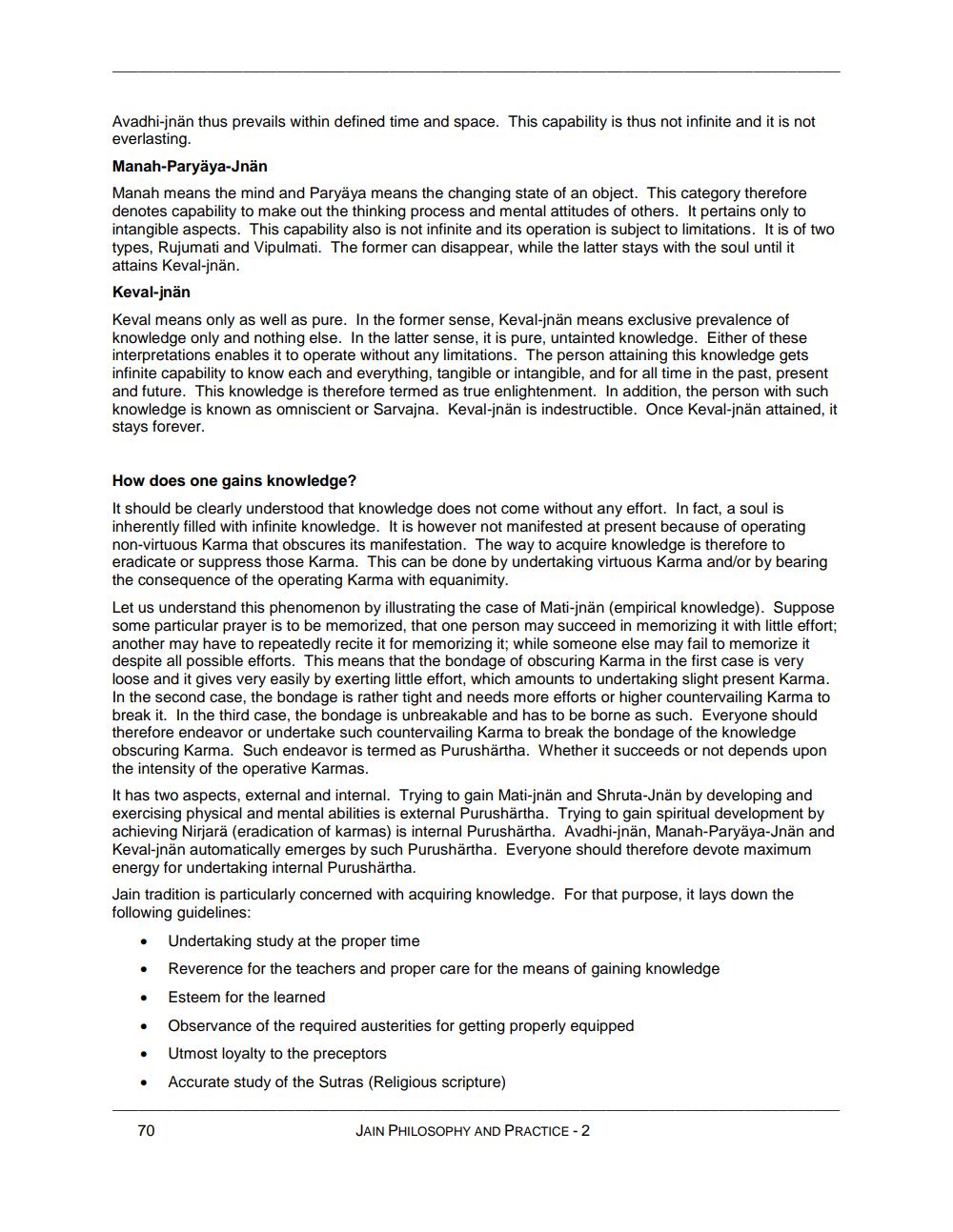________________
Avadhi-jnän thus prevails within defined time and space. This capability is thus not infinite and it is not everlasting. Manah-Paryäya-Jnän Manah means the mind and Paryaya means the changing state of an object. This category therefore denotes capability to make out the thinking process and mental attitudes of others. It pertains only to intangible aspects. This capability also is not infinite and its operation is subject to limitations. It is of two types, Rujumati and Vipulmati. The former can disappear, while the latter stays with the soul until it attains Keval-jnän. Keval-jnän Keval means only as well as pure. In the former sense, Keval-jnän means exclusive prevalence of knowledge only and nothing else. In the latter sense, it is pure, untainted knowledge. Either of these interpretations enables it to operate without any limitations. The person attaining this knowledge gets infinite capability to know each and everything, tangible or intangible, and for all time in the past, present and future. This knowledge is therefore termed as true enlightenment. In addition, the person with such knowledge is known as omniscient or Sarvajna. Keval-jnän is indestructible. Once Keval-inän attained, it stays forever.
How does one gains knowledge? It should be clearly understood that knowledge does not come without any effort. In fact, a soul is inherently filled with infinite knowledge. It is however not manifested at present because of operating non-virtuous Karma that obscures its manifestation. The way to acquire knowledge is therefore to eradicate or suppress those Karma. This can be done by undertaking virtuous Karma and/or by bearing the consequence of the operating Karma with equanimity. Let us understand this phenomenon by illustrating the case of Mati-inän (empirical knowledge). Suppose some particular prayer is to be memorized, that one person may succeed in memorizing it with little effort; another may have to repeatedly recite it for memorizing it; while someone else may fail to memorize it despite all possible efforts. This means that the bondage of obscuring Karma in the first case is very loose and it gives very easily by exerting little effort, which amounts to undertaking slight present Karma. In the second case, the bondage is rather tight and needs more efforts or higher countervailing Karma to break it. In the third case, the bondage is unbreakable and has to be borne as such. Everyone should therefore endeavor or undertake such countervailing Karma to break the bondage of the knowledge obscuring Karma. Such endeavor is termed as Purushärtha. Whether it succeeds or not depends upon the intensity of the operative Karmas. It has two aspects, external and internal. Trying to gain Mati-jnän and Shruta-Jnän by developing and exercising physical and mental abilities is external Purushärtha. Trying to gain spiritual development by achieving Nirjarä (eradication of karmas) is internal Purushärtha. Avadhi-jnän, Manah-Paryäya-Jnän and Keval-jnän automatically emerges by such Purushärtha. Everyone should therefore devote maximum energy for undertaking internal Purushärtha. Jain tradition is particularly concerned with acquiring knowledge. For that purpose, it lays down the following guidelines: • Undertaking study at the proper time
Reverence for the teachers and proper care for the means of gaining knowledge Esteem for the learned Observance of the required austerities for getting properly equipped Utmost loyalty to the preceptors Accurate study of the Sutras (Religious scripture)
JAIN PHILOSOPHY AND PRACTICE - 2




